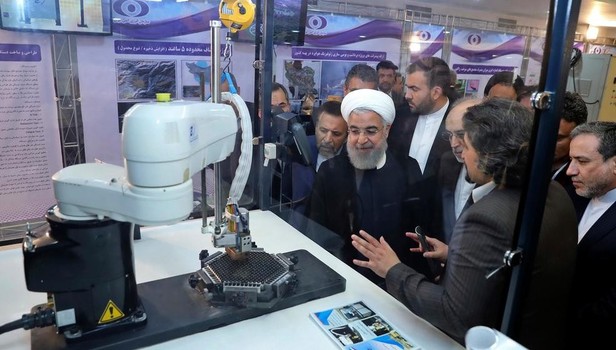Iran will increase nuclear activity, new law made after nuclear scientist's death
03 Dec 2020 ( IBTN News Bureau )
A new law has been passed in Iran's parliament that prohibits UN inspections at the country's nuclear facilities and at the same time Iran will now pursue uranium enrichment.
With the introduction of this new law, the government of Iran will be able to resume uranium enrichment by 20%, which was limited to 3.67% in the 2015 nuclear deal.
According to the 2015 agreement, Iran was allowed to limit its sensitive nuclear activities and allow international inspectors to arrive. In return, the economic sanctions imposed on Iran were ended.
However, Iran's President Hassan Rouhani said before the law was approved that he disagreed with the new law because it would harm diplomacy.
Iranian lawmakers have created this new law after the assassination of Iran's chief nuclear scientist Mohsin Fakhrizadeh on November 27, 2020.
Iran believes that Israel and an exiled opposition jointly attacked Fakhrizadeh with a remote-controlled weapon. Fakhrizadeh was considered the main actor of Iran's nuclear program.
The government of Iran has repeatedly emphasized that all its nuclear activities have been peaceful. Western countries prevented Iran from developing nuclear weapons through a stringent ban.
What does the new law of Iran say?
According to a new law passed by the Guardian Council of Iran, European countries such as Britain, France, Germany, which were included in the 2015 agreement, have been given two months' time to relax Iran's oil restrictions and economic sanctions.
These restrictions were imposed in 2018 after the Trump administration pulled out of the nuclear deal.
If work in this direction is not started within two months, the government of Iran will increase its uranium enrichment by 20% and build new technology-equipped centrifuge at its Nantz and Fordo nuclear center where uranium will be grown.
Under this law, the United Nations will not be able to inspect Iran's nuclear facilities.
According to Iranian news agency Fars, on 02 December 2020, through a letter, the spokesperson of the Parliament of Iran has formally appealed to President Rouhani to implement this new law.
Even before this law was approved, Iran's President Hassan Rouhani said that his government does not agree with this new law. He called this law "harmful for diplomacy" of the country.
Donald Trump and Joe Biden differ on nuclear deal
The nuclear deal was canceled by US President Donald Trump in 2018. He said he wanted a new agreement with Iran that would put an indefinite moratorium on its nuclear program and the development of ballistic missiles. In return, the US imposed strong sanctions on Iran.
On the other hand, the newly elected US President Joe Biden has said that he will re-implement the nuclear deal during the Obama government and if Iran 'strictly abides by the nuclear deal', then the sanctions imposed on Iran will be lifted.
Biden will take oath of President of the United States on January 20, 2021.
In July 2019 itself, Iran raised the limit of 3.67 percent enriched uranium to 4.5% for making nuclear weapons.
U-235 isotopes of low-enriched three to five percent density uranium can be made using electricity as fuel.
The uranium used to make weapons is 90 percent or more enriched.
The 2015 nuclear deal was done to halt Iran's nuclear program and ended sanctions on Iran instead. The United States, Britain, Russia, Germany, France and China had also signed on this nuclear deal with Iran.
(Click here for Android APP of IBTN. You can follow us on facebook and Twitter)
Share This News
About sharing
-
 19 Apr 2025
Meme warfare in Trump’s battle with Beijing
19 Apr 2025
Meme warfare in Trump’s battle with Beijing
Meme warfare in Trump’s battle with Beijing
Saturday, Apr ...
-
 11 Apr 2025
Gaza is a post-apocalyptic killing zone: UNRWA chief Philippe Lazzarini
11 Apr 2025
Gaza is a post-apocalyptic killing zone: UNRWA chief Philippe Lazzarini
Gaza is a post-apocalyptic killing zone: UNRWA chief Philippe Lazzarini
-
 11 Apr 2025
Ralph Wilde on the ICJ & why Israeli occupation must end?
11 Apr 2025
Ralph Wilde on the ICJ & why Israeli occupation must end?
Ralph Wilde on the ICJ & why Israeli occupation must end?
Fr...
-
 10 Apr 2025
Can Europeans alone change the course of Russia's war in Ukraine?
10 Apr 2025
Can Europeans alone change the course of Russia's war in Ukraine?
Can Europeans alone change the course of Russia's war in Ukraine?
... -
 10 Apr 2025
What is behind Trump's U-turn on tariffs?
10 Apr 2025
What is behind Trump's U-turn on tariffs?
What is behind Trump's U-turn on tariffs?
Thursday, Apr 10, ...



